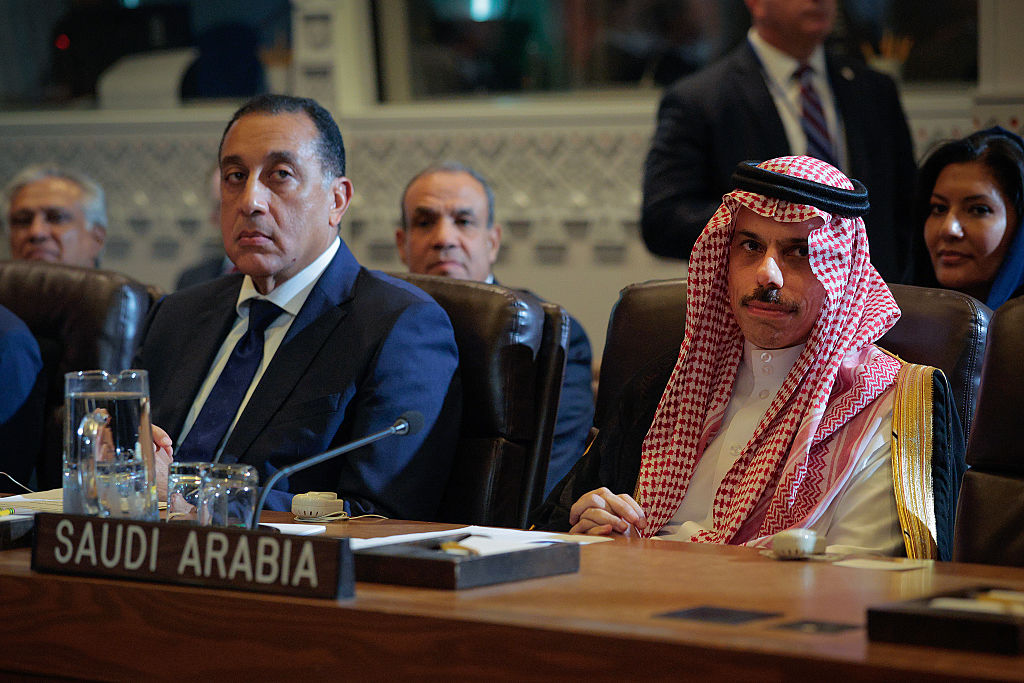On Tuesday in New York City, various leaders of the Gulf Cooperation Council (GCC) countries sat down with President Donald Trump in an atmosphere of deep unease. The summit, which included other Arab and Muslim leaders, came days after the first-ever Israeli airstrike on a Gulf country—a stunning escalation that shook their faith in U.S. security guarantees that underpin stability in their region.
[time-brightcove not-tgx=”true”]
Following the attack, Saudi Arabia, the dominant GCC country, concluded a mutual defense treaty with Pakistan, a military powerhouse with nuclear weapons. The Saudis are believed to have not informed their American partners until the deal was inked.
Some in Washington are interpreting this major development as a Saudi step away from the U.S., a subtle rebuke to the American security umbrella. That is a misreading. The pact is not aimed at Washington but at complementing U.S. security guarantees that have repeatedly proven inadequate—historically against Iran, and most recently in deterring and defending against the Israeli airstrike targeting Hamas negotiators in Qatar.
These concerns and frustrations among America’s Gulf Arab partners are not new. They stretch back over a decade and across Republican and Democratic administrations alike. The Obama Administration secretly negotiated the Iran nuclear deal without consulting GCC capitals. Trump, for all his early outreach, failed to respond during his first term when Houthi drones and missiles linked to Iran came crashing down on Saudi oil facilities in 2019. President Biden, too, looked the other way when the Iran-backed Houthi rebels in Yemen attacked the United Arab Emirates with drones in 2022. Each of these episodes reinforced a perception in Riyadh, Abu Dhabi, and beyond: that the U.S. cannot be relied upon exclusively.
Last week’s brazen Israeli airstrikes against Hamas negotiators in Doha turbocharged those anxieties. For years, Gulf rulers worried about Iran. But now, Israel—Washington’s closest regional ally—crossing such a red line has shaken confidence in America’s willingness to keep the regional balance from tipping dangerously out of control.
The Trump Administration claims it was unable to thwart the attack, notified by Israel just as its jets were in the air and about to fire their missiles. Few Arab leaders believe this narrative, and reporting from Israel suggests Trump was given ample notice.
Arab concerns are amplified by Israeli Prime Minister Benjamin Netanyahu’s own words and actions. Having destroyed much of the Iran-backed axis across the Levant, Netanyahu now boasts that Israel is fighting “on seven fronts,” a sweeping declaration that suggests an ambition to reshape the region far beyond narrow self-defense. Already, Israeli forces have seized and occupied territory in southern Lebanon and in southern Syria. At home, Netanyahu openly flirts with annexing large swaths of the West Bank. To GCC leaders, such rhetoric and actions are not only provocative but destabilizing, threatening to redraw the map of the Middle East unilaterally, replacing Iranian hegemony with that of Israel.
The Gulf states are valuable U.S. partners. Their energy supplies and huge sovereign wealth funds help underwrite America’s competitive edge over China in energy and capital-intensive industries of the future—AI, cloud computing, and the mining and processing of rare-earth minerals. And their hundreds of billions of dollars in U.S. treasury bills bolster the dollar’s status as the world’s reserve currency. Trump certainly understands this, and it’s why he made Saudi Arabia, the UAE, and Qatar his first foreign destination upon taking office, securing billions in new investments.
That is why Trump must take the Saudi-Pakistan defense pact not as a rejection, but as a warning shot. The Gulf states are hedging against Israeli overreach—not abandoning America.
The upcoming visit by Saudi Crown Prince Mohammed bin Salman to Washington this November will present an opportunity to reassure and deepen defense ties with the most important GCC state. And while an ironclad defense treaty ratified by the U.S. Senate remains politically unfeasible, Trump can expand on existing defense commitments modeled on the U.S.–Bahrain Comprehensive Security Integration and Prosperity Agreement (C-SIPA) signed in 2023, the strongest U.S. commitment outside of NATO’s Article 5. These commitments must extend to defending Gulf allies, even when the source of the threat is Israel.
If the Trump Administration fails to act, the Saudi–Pakistan defense pact could become more than just a bilateral agreement. Regional heavyweights Egypt and Turkey, which were also at Tuesday’s meeting, are similarly very concerned about an Israeli-dominated Middle Eastern order. The pact could become the nucleus for other Islamic defense accords—undermining Trump’s signature foreign-policy achievement: the Abraham Accords.
Rather than expanding the Abraham Accords and paving the way for further normalization between Israel and Arab nations, unchecked Israeli overreach will drive America’s Arab and Muslim allies into parallel security arrangements of their own.
The choice before Washington is stark. Reassure America’s Gulf allies and contain Israel within its legitimate borders—or risk watching America’s security architecture in the Middle East unravel.

